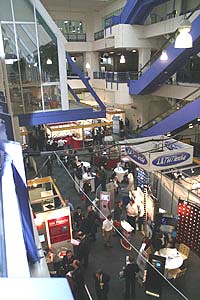News
KioskCom Europe begs questions: Why London, why now?
November 9, 2006
LONDON — The relaxed, been-here-done-that demeanor of show organizers, attendees and exhibitors at KioskCom Europe belies the significance of the event. Several such shows have been conceived; but most resulted in either aborted plans or the birth of non-viable fledglings. Earlier this year, says a journalist who covers European kiosks, an organization began signing exhibitors for a show only to cancel the event weeks before its date.
Yet exhibitors at this inaugural show number within the range acquired by The Self-Service & Kiosk Show (purchased this year by JD Events, owner of KioskCom, from the publisher of this Web site). And the number of registered attendees is almost double. A second kiosk show is being organized for early 2007 in Germany, and its organizer expects the number of booths to double KioskCom Europe's.
The obstacles to putting together self-service expos are obvious and profound, said Francie Mendelsohn, president of Summit Research Associates, which analyzes the global self-service environment.
First is the size of the market.
2007 KioskCom events Feb. 12-13: DubaiApril 25-26: Las VegasOct. 10-11: New York CityNov. 7-8: London |
Entailed is that the European landscape comprises mostly smaller projects, she said. Across Europe, there are few equivalents to mega-deployers like Wal-Mart, Kroger and Walgreen Co., limiting economies of scale and lucre that would tempt more companies.
Another hindrance, she said, is intense nationalism.
 |
(Photograph by Joseph Grove) More than 1,200 attendees had registered for the first KioskCom Europe. The event, held in the Olympia exhibition hall, features two concurrent seminar and presentation tracks, a test-drive area where attendees could put new tech through its paces, and more than 40 exhibits. |
"You can have a company in Great Britain approach a company in Italy with a perfect self-service solution for it and the company in Italy will say, ‘That's nice, but you're not Italian,'" she said. "People still want to do business with their own."
But market forces may be gathering enough energy to overcome those obstacles. Users, at least in the United Kingdom, are increasingly demanding self-service, and one way or another, retailers and other potential deployers will have to find a way to give it to them.
Peter Hill, who works for Germany-based Rittal in the U.K., says the mass acceptance of chip-and-PIN cards has softened British consumers for other self-service applications.
"Two or three years ago, Mr. Average wouldn't use his card," Hill said. "Now he will; hence, the kiosk."
Tony Milne, an attendee representing Digi International, says the U.K. is especially ripe for self-service to come on stronger.
"Bad service is a driver," he said, "and people here — who are a particularly solitary lot — are ready to do more for themselves."
Milne also said the especially high cost of employing service personnel in England is prompting potential deployers to look for ways to save money.
Mendelsohn, who attended earlier show efforts in Europe, was pleased with this one.
"It's like comparing a roller skate to a Lamborghini," she said. "I'm very impressed, for their first time. It's crowded and well run. The attendees are happy. And the exhibitors are happy. And at the end of the day, that's what matters."










